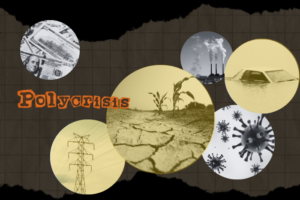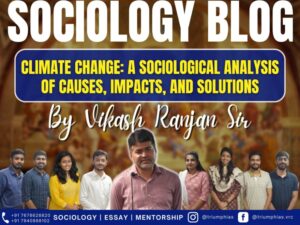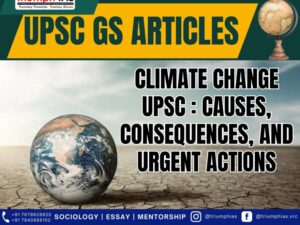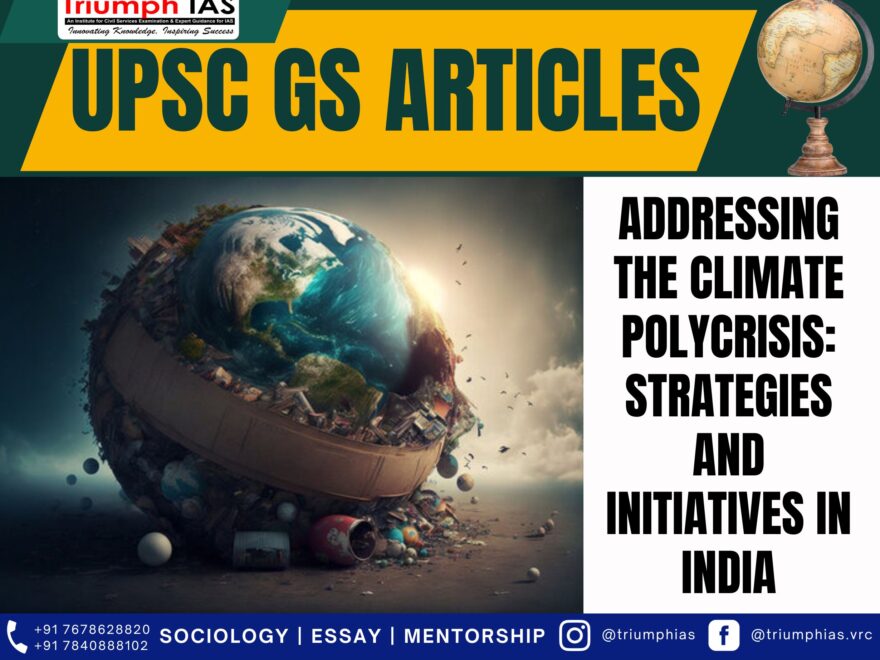Climate Polycrisis: A new face of climate crises.
Relevant for General Studies Paper | Environment | Prelims/Mains.

Climate Polycrisis: A new face of climate crises.
We are confronted with a Climate Polycrisis—a complex and multidimensional challenge demanding immediate action. As per the 2021 WHO Health and Climate Change Survey Report, climate change poses a grave threat to human health and well-being, particularly affecting the most vulnerable populations. The WHO projects that from 2030 to 2050, climate change will result in approximately 250,000 additional deaths annually due to malnutrition, malaria, diarrhea, and heat stress.
Effectively addressing this interconnected crisis requires the formulation of a comprehensive strategy that considers the varied perspectives and objectives of different stakeholders. This strategy should prominently feature principles of resilience, equity, and justice.
Climate polycrises.
The term ‘climate polycrisis,’ popularized by Adam Tooze, denotes the interlinked and compounding crises associated with climate change, affecting not only specific sectors but spanning across various domains and sectors. It involves the tangible consequences of climate change, including elevated temperatures, sea-level rise, and extreme weather events, as well as the social, economic, and political complexities stemming from these consequences. In India, the interdependencies among ostensibly disparate sectors, such as energy, infrastructure, health, migration, and food production, reveal the influence of climate change on multiple fronts.
Causes of Climate Polycrisis.
- Greenhouse Gas Emissions: Human activities, particularly the combustion of fossil fuels (such as coal, oil, and natural gas), deforestation, agricultural practices, and industrial processes, release greenhouse gases (GHGs) like CO2, methane, and nitrous oxide into the atmosphere. These GHGs trap heat from the sun, leading to global warming and alterations in the Earth’s climate system.
- Unsustainable Consumption and Production: Unsustainable consumption patterns involve utilizing natural resources at a rate that surpasses their regeneration, depleting these resources. Additionally, unsustainable production practices generate waste and pollution, further harming the environment. These unsustainable practices can diminish the Earth’s capacity to provide essential services like clean water, fertile soil, and biodiversity.
- Lack of Political Will and Collective Action: Addressing the climate crisis and environmental challenges necessitates coordinated efforts at the local, national, and global levels. A deficiency in political will and insufficient collective action can impede the implementation of effective policies and measures to reduce emissions, adapt to climate change, and support vulnerable communities.
For example, even eight years after signing the Paris Agreement, it has largely failed to combat climate change. During the last eight years (2015-2022), each year consecutively has been the warmest on record globally. The globally updated Nationally Determined Contributions (NDCs) to limit global warming to 1.5°C have fallen short of achieving the 2°C target. Furthermore, the agreement has not been successful in equitably phasing out fossil fuels, the primary culprits behind the climate crisis.
Effects of Climate Polycrisis.
- Implementing National Carbon Accounting (NCA): Establish a comprehensive system for NCA that measures and monitors carbon emissions from individuals to the entire nation, encompassing businesses and households.
- Promoting Carbon Awareness: Educate the public about the significance of carbon emissions and their impact on climate change. Enhance the visibility of carbon emissions and their consequences for the general population.
- Introducing Carbon Taxation: Implement a progressive carbon tax system based on NCA data. Penalize significant emitters more than average consumers to incentivize efforts for carbon reduction.
- Setting Realistic Reduction Targets: Utilize the NCA system to establish specific, science-based carbon reduction targets for the nation. Align these targets with global climate goals, such as achieving net-zero emissions.
- Predicting and Tracking Progress: Use NCA data to forecast future emission reductions and consistently monitor progress toward meeting carbon reduction targets. Adjust policies and strategies as necessary.
- Innovating for Carbon Reduction: Promote the development and adoption of innovative technologies and practices that reduce carbon emissions. Support research and development in sustainable technologies.
- Carbon GDP as a Parallel Goal: Alongside traditional economic GDP, introduce “carbon GDP” as a parallel goal. Encourage countries to strive towards reducing their carbon GDP to promote ecological sustainability.
- Public Discourse and Engagement: Cultivate a new form of public discourse on carbon emissions and sustainability. Engage citizens in discussions about the environment and the economy’s role in it.
- Aligning Development and Sustainability: Ensure that economic development and sustainability goals are aligned. Use NCA data to make well-informed decisions that balance economic growth with environmental protection.
- Global Adoption: Advocate for the global adoption of NCA systems, urging other nations to implement similar frameworks for tracking and managing carbon emissions.
- Creating New Livelihoods: Explore opportunities for generating new livelihoods and economic activities related to carbon reduction, such as industries in renewable energy and carbon offset projects.
- Policy Integration: Integrate carbon accounting and reduction measures into various policy areas, including energy, transportation, agriculture, and industry.
- International Cooperation: Collaborate with other countries to address the global nature of the climate poly crisis. Share best practices, technologies, and resources for a collective effort.
Addressing the climate polycrisis demands a thorough and unified strategy that involves diverse sectors of society, ranging from individuals and businesses to governments and international organizations. The adoption of a national carbon accounting system stands as a pivotal measure in this initiative, offering the necessary data and structure to make informed choices and monitor advancements toward a more sustainable future.
India’s Climate Change Mitigation Initiatives.
National Action Plan on Climate Change (NAPCC):
Launched in 2008 to address climate change challenges in India. It Aims to achieve low-carbon and climate-resilient development for India.
There are 8 national missions forming the core of the NAPCC which represent multi-pronged, long term and integrated strategies for achieving key goals in climate change. These are-
- National Solar Mission.
- National Mission for Enhanced Energy Efficiency.
- National Mission on Sustainable Habitat.
- National Water Mission.
- National Mission for Sustaining the Himalayan Ecosystem.
- National Mission for A Green India.
- National Mission for Sustainable Agriculture.
- National Mission on Strategic Knowledge for Climate Change.
- Nationally Determined Contributions (NDC).
- National Adaptation Fund on Climate Change (NAFCC).
- State Action Plan on Climate Change (SAPCC).
Nationally Determined Contributions (NDC):
- India’s commitments to reduce greenhouse gas emissions and adapt to climate change.
- Pledged to reduce the emissions intensity of GDP by 45% by 2030 from 2005 levels and generate. 50% of electricity from non-fossil fuel sources by 2030.
- Pledged to create additional carbon sink and achieve net zero emissions by 2070.
National Adaptation Fund on Climate Change (NAFCC):
Established in 2015 to provide financial assistance to state governments for implementing adaptation projects in various sectors.
State Action Plan on Climate Change (SAPCC):
- Encourages all states and union territories to prepare their own SAPCCs based on their specific needs and priorities.
- SAPCCs outline strategies and actions for addressing climate change at the sub-national level.
- Aligned with the objectives of the NAPCC and the NDC.
Reference: The Hindu
Related Blogs…
 |
 |
Frequently Asked Questions:
1. Question: Define the term ‘Climate Polycrisis’ and mention its effects on multiple sectors.
Answer: Climate polycrisis refers to the interlinked crises associated with climate change, impacting various sectors like energy, infrastructure, health, migration, and food production through direct consequences like temperature elevations and indirect complexities in socio-economic and political realms.
2. Question: Enumerate the causes of the climate polycrisis.
Answer: The causes of the climate polycrisis include greenhouse gas emissions from human activities such as fossil fuel combustion, deforestation, and industrial processes, unsustainable consumption and production patterns that deplete natural resources, and a lack of political will and collective action to implement effective climate policies and measures.
3. Question: What are the objectives and core missions of India’s National Action Plan on Climate Change (NAPCC)?
Answer: NAPCC, launched in 2008, aims for low-carbon and climate-resilient development in India through its 8 core missions, which are National Solar Mission, National Mission for Enhanced Energy Efficiency, National Mission on Sustainable Habitat, National Water Mission, National Mission for Sustaining the Himalayan Ecosystem, National Mission for A Green India, National Mission for Sustainable Agriculture, and National Mission on Strategic Knowledge for Climate Change.
4. Question: Briefly discuss India’s commitment under the Nationally Determined Contributions (NDC).
Answer: Under the NDC, India has committed to reduce the emissions intensity of its GDP by 45% by 2030 from 2005 levels, ensure that 50% of its electricity will come from non-fossil fuel sources by 2030, and create additional carbon sinks, with an overarching aim to achieve net-zero emissions by 2070.
5. Question: How does National Carbon Accounting (NCA) contribute to addressing the climate polycrisis?
Answer: National Carbon Accounting (NCA) offers a systematic approach to measure and monitor carbon emissions at various levels, from individuals to nations, facilitating the establishment of science-based carbon reduction targets, monitoring progress, implementing carbon taxation, and promoting carbon awareness and reduction innovations, thus contributing to informed decision-making in addressing the climate polycrisis.
GS Related Practices Questions…
To master these intricacies and fare well in the Sociology Optional Syllabus, aspiring sociologists might benefit from guidance by the Best Sociology Optional Teacher and participation in the Best Sociology Optional Coaching. These avenues provide comprehensive assistance, ensuring a solid understanding of sociology’s diverse methodologies and techniques.
META TAGS:
Climate Polycrisis, Climate Polycrisis UPSC, Climate Polycrisis in India upsc, Carbon Reduction, National Carbon Accounting, NAPCC, NDC, Climate Change, Global Warming, Sustainability, India Climate Strategy, Environmental Health, Greenhouse Gas Emissions, Climate Mitigation, Adaptation Initiatives, Climate Justice, Climate Impact, Sustainable Development

Why Vikash Ranjan’s Classes for Sociology?
Proper guidance and assistance are required to learn the skill of interlinking current happenings with the conventional topics. VIKASH RANJAN SIR at TRIUMPH IAS guides students according to the Recent Trends of UPSC, making him the Best Sociology Teacher for Sociology Optional UPSC.
At Triumph IAS, the Best Sociology Optional Coaching platform, we not only provide the best study material and applied classes for Sociology for IAS but also conduct regular assignments and class tests to assess candidates’ writing skills and understanding of the subject.
Choose The Best Sociology Optional Teacher for IAS Preparation?
At the beginning of the journey for Civil Services Examination preparation, many students face a pivotal decision – selecting their optional subject. Questions such as “which optional subject is the best?” and “which optional subject is the most scoring?” frequently come to mind. Choosing the right optional subject, like choosing the best sociology optional teacher, is a subjective yet vital step that requires a thoughtful decision based on facts. A misstep in this crucial decision can indeed prove disastrous.
Ever since the exam pattern was revamped in 2013, the UPSC has eliminated the need for a second optional subject. Now, candidates have to choose only one optional subject for the UPSC Mains, which has two papers of 250 marks each. One of the compelling choices for many has been the sociology optional. However, it’s strongly advised to decide on your optional subject for mains well ahead of time to get sufficient time to complete the syllabus. After all, most students score similarly in General Studies Papers; it’s the score in the optional subject & essay that contributes significantly to the final selection.
“A sound strategy does not rely solely on the popular
Opinion of toppers or famous YouTubers cum teachers.”
It requires understanding one’s ability, interest, and the relevance of the subject, not just for the exam but also for life in general. Hence, when selecting the best sociology teacher, one must consider the usefulness of sociology optional coaching in General Studies, Essay, and Personality Test.
The choice of the optional subject should be based on objective criteria, such as the nature, scope, and size of the syllabus, uniformity and stability in the question pattern, relevance of the syllabic content in daily life in society, and the availability of study material and guidance. For example, choosing the best sociology optional coaching can ensure access to top-quality study materials and experienced teachers. Always remember, the approach of the UPSC optional subject differs from your academic studies of subjects. Therefore, before settling for sociology optional, you need to analyze the syllabus, previous years’ pattern, subject requirements (be it ideal, visionary, numerical, conceptual theoretical), and your comfort level with the subject.
This decision marks a critical point in your UPSC – CSE journey, potentially determining your success in a career in IAS/Civil Services. Therefore, it’s crucial to choose wisely, whether it’s the optional subject or the best sociology optional teacher. Always base your decision on accurate facts, and never let your emotional biases guide your choices. After all, the search for the best sociology optional coaching is about finding the perfect fit for your unique academic needs and aspirations.
To master these intricacies and fare well in the Sociology Optional Syllabus, aspiring sociologists might benefit from guidance by the Best Sociology Optional Teacher and participation in the Best Sociology Optional Coaching. These avenues provide comprehensive assistance, ensuring a solid understanding of sociology’s diverse methodologies and techniques. Sociology, Social theory, Best Sociology Optional Teacher, Best Sociology Optional Coaching, Sociology Optional Syllabus.
Best Sociology Optional Teacher, Sociology Syllabus, Sociology Optional, Sociology Optional Coaching, Best Sociology Optional Coaching, Best Sociology Teacher, Sociology Course, Sociology Teacher, Sociology Foundation, Sociology Foundation Course, Sociology Optional UPSC, Sociology for IAS,
Follow us :
🔎 https://www.instagram.com/triumphias
🔎https://www.youtube.com/c/TriumphIAS
🔎https://t.me/VikashRanjanSociology
Find More Blogs…
| Compare and contrast Karl Marx’s and Max weber’s | Karl Marx- Historical Materialism |
| Talcott Parsons : Social system | Scope of the subject and comparison with other social sciences |



